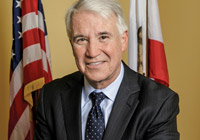IF THE FEDERAL GOVERNMENT IS “GOING TO WAR” WITH CALIFORNIA, as Gov. Jerry Brown has said, a lawsuit filed against the state in March by U.S. Attorney General Jeff Sessions makes immigration enforcement the fiercest and perhaps most consequential battleground.
Sessions’ suit targets three laws at the heart of California’s sanctuary policies. The laws forbid police from alerting Immigration and Customs Enforcement (ICE) agents so they can pick up undocumented immigrants when they are released from state or local custody; prohibit business
owners from voluntarily helping ICE agents find undocumented workers; and require state inspection of federal detention centers to prevent mistreatment and abuse.
For state Attorney General Xavier Becerra, as well as for many other legal experts, the clash over immigration is about nothing less than upholding the balance of power between states and the U.S. government, which is baked into the U.S. Constitution. Becerra and others accuse Sessions and the Donald Trump administration of an illegal and unwarranted power grab.
This very bitter public fight between the administration and California, as well as a handful of other states, is hardly surprising. During a telephone interview from Boulder, Colorado, where he is spending part of his sabbatical, Professor Hiroshi Motomura called the role of states and cities
in immigration enforcement a “huge gray area.” Sessions’ lawsuit, which could eventually end up before the U.S. Supreme Court, may clarify, if not significantly alter, the federal-state relationship.
Motomura, a Berkeley law graduate who joined the UCLA Law School faculty in 2007 and serves as vice chair of the board of directors at the National Immigration Law Center, has written extensively about that relationship, particularly with respect to immigration and citizenship. He said state and local leaders assert their authority over immigrants indirectly as well as directly. “These officials are saying, ‘We’ll treat you like you live here, regardless of your immigration status. You and your family have the right to the same police protection as anyone else,’” Motomura said. This position “is less pro-enforcement than protecting
local prerogatives.”
By trying to enlist local police to assist federal immigration agents, Motomura said, the Trump administration is draining resources from other policing needs. The “gray area,” he and other experts said, has now become furiously contested ground. Lack of clarity in this contest centers
upon interpretation of the 10th Amendment, which reserves to “the states respectively, or to the people,” those powers not “delegated to the United States by the Constitution, nor prohibited by it to the states.”
“They send us their rapists”
Immigration was a central theme of Donald Trump’s campaign for the presidency and, according to opinion polls, a major factor in his victory. He promised to build a wall along the U.S.-Mexico border and detain and deport anybody who entered the country illegally. As president, Trump has asserted a muscular and virtually unchecked view of the federal government’s authority to do so.
Within days of taking office, he issued the first of several executive orders banning immigrants from predominantly Muslim nations from entering the United States, including those with visas and green cards. Judges have blunted enforcement of those orders, and legal challenges continue. In
September, Trump said he would end the Deferred Action for Childhood Arrivals (DACA) program, which protects an estimated 800,000 people brought to this country illegally by their parents as young children. He gave Congress six months to determine what to do about the Dreamers,
as they are known. Congress has done nothing, and courts have so far allowed the program to continue. Motomura has assisted in challenges to Trump’s DACA order and travel bans. Meanwhile, under orders from the departments of Justice and Homeland Security, agents from ICE have
taken undocumented immigrants into custody, including those without criminal histories, as they dropped off their children at school, worked cash registers at 7-Eleven stores, or arrived in court to testify as witnesses to a crime or pay traffic tickets.
This marks a major departure from the George W. Bush and Barack Obama administrations, which focused upon undocumented immigrants who had committed violent or other serious crimes. Both Bush and Obama made it a point to defer to state authority in at least some areas of immigration control and enforcement.
While the federal government is clearly responsible for issuing visas, patrolling borders and setting rules for naturalization and citizenship, several states insist that their police powers require them to protect the health and welfare of all residents, regardless of legal status. California,
Illinois, New York, Colorado, Nevada, Oregon, Washington state and dozens of cities are “clarifying that they’re not going to be immigration officers,” said Matt Barreto, UCLA professor of Political Science and Chicana/o Studies, whose research examines the political participation of
racial and ethnic minorities.
No one thought much about state and local authority in immigration enforcement until Trump became president, noted Los Angeles city attorney Mike Feuer. But “the world has changed,” he said. “My office, historically, was never involved. Now we’re knee deep in these issues.”
The federal government’s aggressive stand against immigration strikes Abel Valenzuela, professor of Chicano studies and urban planning, as particularly misguided, given a decrease in the number of people entering the United States illegally or overstaying their visas. The drop has been
documented by a number of research institutions including the Center for Migration Studies in New York. Valenzuela, director of UCLA’s Institute for Research on Labor and Employment, said the decline, which began during the Obama years, is partly the result of stepped-up border enforcement, which has made crossings far more perilous. Valenzuela calls the Trump administration’s forceful position “a huge overreach.”
California’s approach
Many California public officials consider the integration of immigrants into their communities an important goal that furthers the immigrants’ ability to educate their children, work and pay taxes. As a result, state and local leaders have adopted a number of policies that assist immigrants. California allows the undocumented to apply for a driver’s license. It makes them eligible for in-state tuition at state colleges and universities. Last year, both Los Angeles city and county joined with charitable foundations to create a $10 million L.A. Justice Fund, which provides assistance to immigrants facing deportation who cannot afford a lawyer.
Local and state officials also have minimized cooperation with ICE to protect from deportation immigrants who have not committed a crime.Only days after Trump’s election, Los Angeles Police Chief Charlie Beck reaffirmed his department’s commitment to Special Order 40,
adopted in 1979, which prohibits officers from initiating contact with people solely to determine whether they are in this country legally. Last year, State Labor Commissioner Julie A. Su directed her staff to turn away ICE agents who do not have warrants. Her directive followed reports of agents seeking information about workers who had filed claims against their employers.
After reports last year that ICE agents appeared to be stalking undocumented immigrants in courthouses to make arrests, California Chief Justice Tani Cantil-Sakauye sent a strongly worded letter to Attorney General Sessions and then-Secretary of Homeland Security John Kelly, requesting that “you refrain from this sort of enforcement.” In response, Sessions scolded the chief justice, insisting that federal law authorizes ICE agents to make arrests “where probable cause exists to believe that such aliens are in violation of federal law.”
The courthouse raids, as well as other ICE actions, have prompted UCLA to post guidance online should immigration agents seek entry to student dormitories or ask campus employees to produce information about fellow employees or about patients at the UCLA Medical Center. Valenzuela, the Chicano studies professor, said campus police have assured university officials that ICE will not conduct raids on campus, but “by no means do I sleep well.”
State Sen. Ricardo Lara (D-Bell Gardens) has introduced legislation barring immigration agents from entering schools, courthouses and state buildings to question or arrest people without a warrant. The measure has passed the Senate and is before the Assembly. “We want to empower
our immigrants to know their rights,” Lara said, adding, “California is entirely within our rights under the 10th Amendment.”
Lara, Becerra and other state officials worry that immigrants will retreat into the shadows and be easily victimized. The officials point to data indicating a significant drop in reports of workplace violations, domestic violence and crime within immigrant communities since Trump took office.
Defiance or protection?
Gov. Brown’s decision last year to sign the laws cited in Sessions’ lawsuit is the state’s most pointed assertion of broad authority to protect all of its residents.
To Sessions, the laws are a brazen and intolerable act of defiance. “Federal law is the supreme law of the land,” Sessions declared in a speech delivered the day after he filed his suit in federal court. He accused California of using “every power the legislature has to undermine the duly established immigration laws of America.”
Sessions looks to an Obama-era ruling by the U.S. Supreme Court to support his case. That decision, in 2012, overturned some provisions in a controversial Arizona law permitting local police who lawfully stop someone for an unrelated reason to demand proof of that person’s legal status and making it a misdemeanor for an immigrant to be in Arizona without carrying the requisite documents.
Motomura and other legal experts say the California laws differ from the Arizona law in key ways: The California laws were drafted to safeguard the constitutional rights of all California residents by making sure that federal priorities don’t override state priorities, Motomura said. By contrast, the Arizona law was an effort by the state to become actively involved in federal immigration enforcement. The California statutes, which Motomura believes are more accurately called “rule-of-law laws” rather than sanctuary laws, regulate state and local law enforcement,
as well as private companies doing business in California, something the state has the right to do.
Sessions’ lawsuit cites these California laws:
» SB 54, which bars police in many cases from notifying ICE agents so they can take undocumented migrants into federal custody when they are being released from state or local custody.
» AB 450, which makes business owners liable to fines if they give ICE agents without a judicial warrant access to non-public areas of their establishments, share information with the agents about their workers, or fail to alert workers if agents are going to examine their records. Becerra said the fines could be as high as $10,000.
» AB 103, which mandates state reviews to prevent mistreatment at all facilities where immigrants are being held by the federal government.
Sessions said the laws violate the U.S. Constitution by interfering with federal immigration enforcement. If successful, his suit could affect immigration enforcement in other states and cities across the country.
In a telephone press conference immediately after Sessions filed his suit, Becerra emphatically dismissed his arguments. “There’s nothing really new here,” Becerra said. “California stands on strong legal footing because of the Constitution, and we won’t have our resources commandeered by the feds to do their bidding.”
In April, U.S. District Judge Manuel Real ruled that Sessions was indeed violating the Constitution by making it harder for police departments to receive federal funds if they refused to notify ICE before releasing inmates targeted for deportation or if they barred ICE agents for access to inmates
and their records.
“We are not in the business of deportations,” Becerra said, adding: “We’ve seen this B-rated movie before.”

























